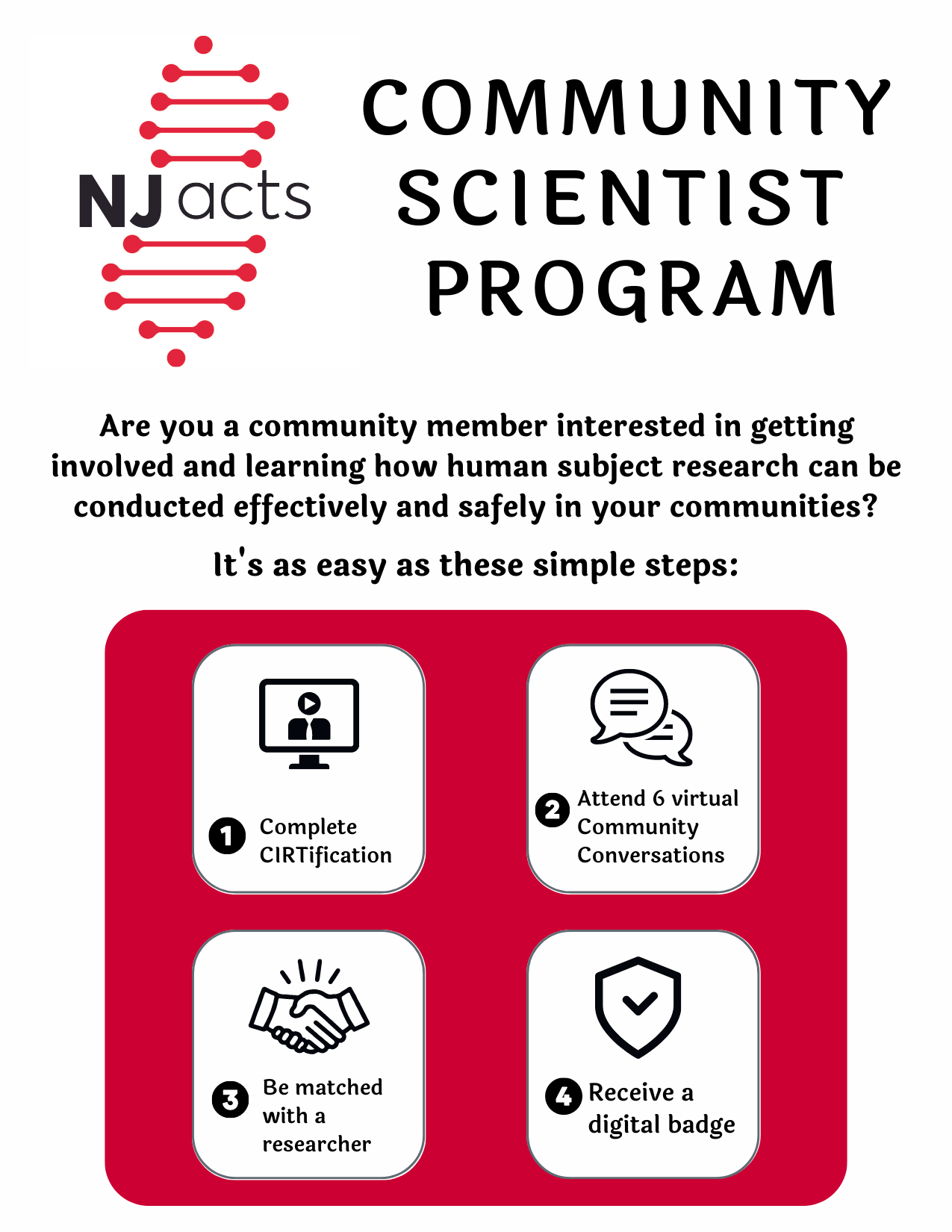180+ networks across 21 NJ counties
COMMUNITY ENGAGEMENT CORE OVERVIEW
NJACTS draws leading academic, industry and community groups together to understand and address the health needs of New Jersey. Central to this is engagement with our community to ensure that our efforts respond to their priorities. Our goal is to conduct research with the New Jersey community, in the community and for the community, and yet, have impact beyond our state’s boundaries.
Stay in Touch!
Join RCommunity!
Join Rutgers Health Service Corps!
Empowering Community-Based Research
Through Cultural and Linguistic Collaboration
- Navigating interpreter-mediated encounters
- Effective translation for research
- Understanding cultural nuances in literacy, trust, and belonging
Through collaboration across disciplines and leveraging expertise within and beyond Rutgers, CrEER ensures that research is inclusive, culturally relevant, and impactful both locally and globally.
👉 Discover how CrEER is shaping the future of community-based research here.
Association for Clinical and Translational Science (ATCS) Membership for Community Members
Did you know that community members are eligible to become members of ACTS through their affiliation with NJ ACTS?
Community members are able to access ACTS’ member benefits, including:
- Discounted registration to the annual Translational Science meeting
- Opportunities to participate in Special Interest Groups and Committees
- Access to the community platform website and more!
Resource for Investigators – CTSA Compendium of D&I Catalogs
Dissemination and implementation (D&I) research focuses on translating evidence-based interventions into real-world settings to improve health outcomes in the broader community.
An open-source CTSA Compendium of D&I Catalogs has been developed by the Clinical & Translational Science Awards (CTSA) Program’s “Advancing Dissemination and Implementation Sciences in CTSAs” working group to support investigators at any stage of their D&I skill-building journey. It provides a curated list of resource catalogs relevant to the conduct of D&I science. The materials include frameworks/theories/models, methods/measures, funding resources, practice resources, training, and health equity resources. Click here to learn more.
CIRTification – A New Alternative to CITI for Community Partners
The rollout of CIRTification at Rutgers has begun. The CIRTification program provides research ethics training alternatives for individuals in community organizations, with limited understanding of conducting human research and protecting potential research participants. This option provides training focused on equipping community partners to conduct human subject research effectively and safely in their communities.
To learn more about the program at Rutgers, please visit this link CIRTification.
NJ ACTS COMMUNITY SCIENTIST PROGRAM
This program is designed to provide researchers with rapid feedback from expert community members to ensure their research projects are culturally appropriate and relevant to the community.
PARTICIPATE IN OUR NEXT COHORT!
For more information, please contact njactscommunity@rwjms.rutgers.edu
NJ HEROES TOO
Through the ongoing New Jersey Healthcare Essential Worker Outreach and Education Study – Testing Overlooked Occupations (NJ HEROES TOO), we have gained a wealth of data on COVID-19’s effects, gleaned valuable learnings on attitudes toward testing and vaccines, and improved COVID-19 awareness in underserved communities.

Community Blog
NJACTS Community Engagement Core Available Services
Virtual Community Engagement Salon The NJ ACTS CEC Virtual Community Engagement Salons bring researchers together with patients, community members and health care stakeholders to actively participate in cross-talk — to incubate ideas for engagement in the...
N.J. scientists: Trump’s EPA disregards our health to serve corporate interests.
The recent decision by the U.S. Environmental Protection Agency (EPA) to propose ending the requirement for industries to report their greenhouse gas emissions is a profound betrayal of the agency’s foundational mission. Established in 1970 with bipartisan support,...

O’Shea awarded a NJ ACTS translational science fellowship.
MD/PhD student Callan O’Shea, a member of the Princeton University Department of Molecular Biology (MOL), is the newest recipient of the New Jersey Alliance for Clinical and Translational Science Award (NJ ACTS) T32 Fellowship. O’Shea joined the ranks of six other...
Medicaid cuts could be dangerous for cancer survivors.
When Valerie Brown’s lung cancer returned and began to spread to other parts of her body, her doctors suggested a drug that would slow the cancer’s growth. She’d already had surgery and radiation, and eliminating the cancer was no longer an option. Most people with...
Rutgers Health expert urges vaccinations ahead of respiratory illness season.
With flu, COVID-19 and RSV expected to circulate widely again this fall and winter, a Rutgers Health infectious disease expert is urging people to get vaccinated in the coming weeks to reduce the risk of severe illness. Between Oct. 1, 2024, and May 17, the flu alone...
Four Research Teams Are Awarded Funding from Institute for Health Data Core.
Officials with the Rutgers Institute for Health, Health Care Policy and Aging Research (IFH) have selected four research teams as the first recipients of its inaugural Data Core Pilot Grant Awards. Each team will receive up to $35,000 to support projects that...


